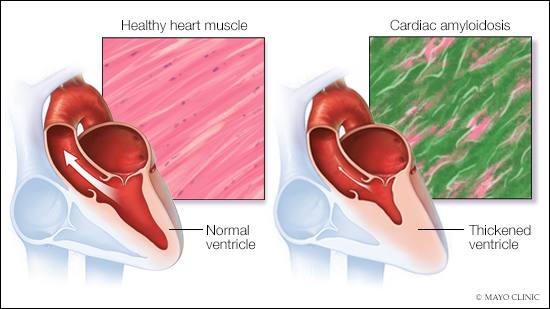-
Mayo Clinic Q&A podcast: Successful treatment of cardiac amyloidosis depends on early diagnosis

Cardiac amyloidosis is a type of amyloidosis, which occurs when the body produces abnormal proteins that bind together to form a substance called amyloid. Amyloids can deposit in any tissue or organ, including the heart, kidneys, liver and nerves.
When amyloid collects in the heart muscle, it causes irreversible thickening of the heart wall and disrupts heart function. It reduces your heart's ability to fill with blood between heartbeats, resulting in less blood being pumped with each beat. This can result in shortness of breath. Cardiac amyloidosis also can affect your heart's electrical system, resulting in a disturbed heart rhythm.
Cardiac amyloidosis typically presents as a form of congestive heart failure. It is often overlooked because the symptoms can masquerade as other conditions. Unfortunately, there aren't any preventive strategies for cardiac amyloidosis, says Dr. Melissa Lyle, a Mayo Clinic cardiologist.
"So the key, really, is early detection," says Dr. Lyle. "We want to make sure that we can detect these patients earlier, to get them on the right treatments."
Dr. Lyle says it's important that patients bring any concerning symptoms to their health care provider as soon as possible.
At Mayo Clinic, people with symptoms that indicate they might have cardiac amyloidosis are diagnosed and treated by a team of experts in the Cardiac Amyloidosis Clinic. This specialized care is available at Mayo Clinic’s locations in Arizona, Florida and Minnesota.
“This approach is a collaborative effort amongst several different specialties, including hematology, cardiology, transplant cardiology, as well as neurology and nephrology,” explains Dr. Lyle. “And our goal is really to provide an efficient evaluation for our patients so that we can quickly come to the correct diagnosis and offer the best treatment option. And we're engaging all of our different specialties for this comprehensive visit to provide the best overall care.”
On the Mayo Clinic Q&A podcast, Dr. Lyle discusses diagnosis, standard treatment options and new therapies for treating cardiac amyloidosis.
Additional resources:
- What is amyloidosis and 10 signs you might have it
- Expert Alert: Cardiac amyloidosis masquerades as other conditions; 1 type affects more black Americans
- Sharing Mayo Clinic: Pedaling his way to heart transplant
- Sharing Mayo Clinic: New heart, new start
_______________________________________________
Watch: Dr. Lyle discusses cardiac amyloidosis
For the safety of its patients, staff and visitors, Mayo Clinic has strict masking policies in place. Anyone shown without a mask was either recorded prior to COVID-19 or recorded in a nonpatient care area where social distancing and other safety protocols were followed.
Related Articles







